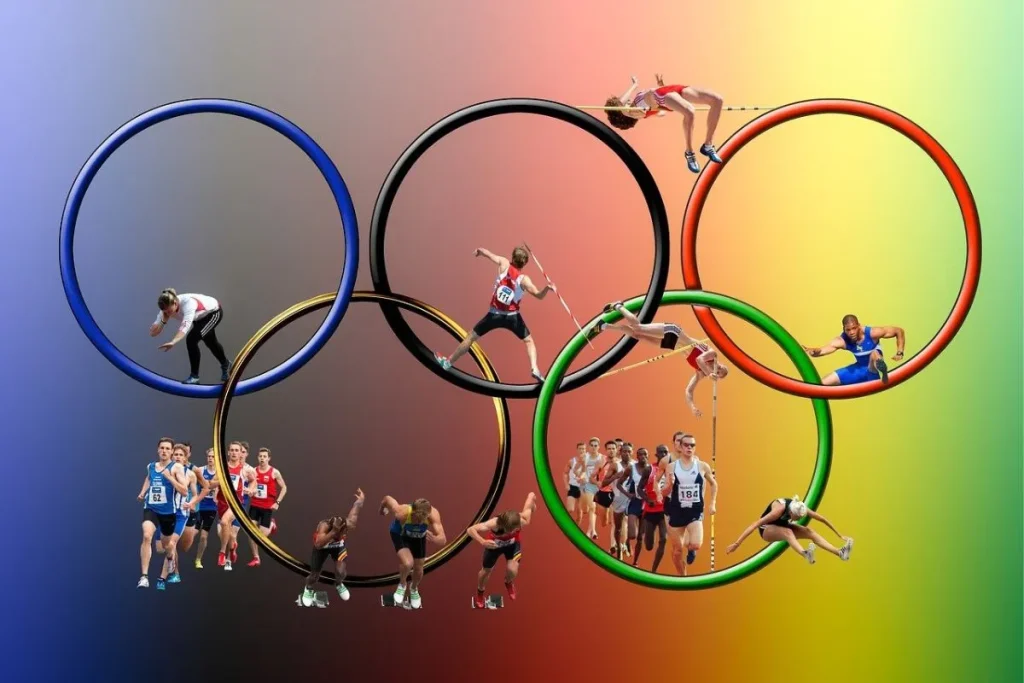The Olympic rings are iconic. They’re recognized everywhere. But what’s the story behind them? Let’s dive into the history and symbolism of the Olympic rings. You’ll discover why they represent much more than just a sporting event.
Birth of the Olympic Rings
Designed by Pierre de Coubertin
In 1913, Pierre de Coubertin had a vision. He wanted a symbol for the modern Olympics. He designed five interlocking rings. This design became the emblem of unity.
Five Rings, Five Continents
The rings stand for the continents. Africa, the Americas, Asia, Europe, and Oceania. Each ring represents one of these. They come together in harmony.
Colors That Unite
The rings have five colors: blue, yellow, black, green, and red. Coubertin chose these colors for a reason. At the time, every national flag included at least one of these colors. The message was clear: inclusion for all.
The Early Days
Introduction to the World
The rings were introduced in 1914. They were first used at the 1920 Antwerp Games. Athletes and spectators alike embraced them.
A Symbol of Hope
The rings soon symbolized hope. The world was recovering from World War I. The Olympic Games offered a sense of unity.
Spreading the Message
As the Games grew, so did the rings’ popularity. They were used on flags, banners, and promotional materials. The Olympic rings became a universal sign of peace.
The Rings During World War II
The Olympics Canceled
World War II disrupted many things. The Olympic Games were canceled in 1940 and 1944. But the rings remained a beacon of hope.
An Enduring Symbol
During the war, the rings symbolized international unity. They represented the desire for peace. People looked to the Olympics for a brighter future.
The Modern Olympic Rings

Recognized Worldwide
Today, the Olympic rings are known globally. They transcend cultural and language barriers. The rings represent competition and camaraderie.
Appearing Everywhere
The rings are more than just a logo. They’re on uniforms, merchandise, and marketing materials. They remind us of the Olympic spirit.
A Symbol of Excellence
The rings are associated with excellence. Athletes strive for greatness under this emblem. The Olympic rings inspire countless people worldwide.
Cultural Impact
Global Influence
The Olympic rings have a vast cultural impact. They are recognized everywhere. People associate them with peace and unity.
Iconic Moments
The rings have been part of many iconic moments. Remember the opening ceremonies? Or the lighting of the Olympic flame? The rings are present during these special times.
Inspiration for Other Events
Other events have been inspired by the rings. Many international competitions have their unique symbols. But the Olympic rings remain unmatched.
The Olympic Spirit
Uniting the World
The Olympics unite the world. Countries come together to celebrate sport. The rings symbolize this unity.
Promoting Peace
The Olympic Games promote peace through sport. The rings are a constant reminder of this goal.
A Legacy of Friendship
The rings encourage friendship among nations. Athletes from all over form bonds. These connections last a lifetime.
The Rings’ Message
A Powerful Symbol
The rings are more than five circles. They’re a powerful message of unity. They remind us of our shared humanity.
Embracing Diversity
The rings celebrate diversity. They represent all nations and cultures. The Olympics welcome everyone.
Inspiring Future Generations
The rings inspire future generations. Young athletes dream of competing under them. They strive for excellence and unity.
The Future of the Olympic Rings
Continuing the Tradition
The Olympic rings will continue their legacy. They’ll inspire athletes and fans alike. The tradition will carry on for generations.
Adapting to Modern Times
The rings will adapt to the modern world. They’ll embrace new technologies and ideas. But their core message will remain.
A Timeless Symbol
The Olympic rings are timeless. They’ll always represent unity and peace. They are a beacon of hope for all.
Conclusion
The Olympic rings tell a fascinating story. They were designed to unite the world. Over time, they have become a symbol of peace and excellence. Their legacy will continue to inspire future generations. The rings are more than just a logo. They’re a powerful reminder of our shared humanity.
The Olympic rings are a timeless symbol that will always represent the unity and diversity of the world. They inspire hope, promote peace, and remind us of the incredible power of sport to bring people together. As we celebrate the Olympic Games, let’s remember the story behind the rings and the values they stand for.
Get more info: https://www.timelinetale.com/